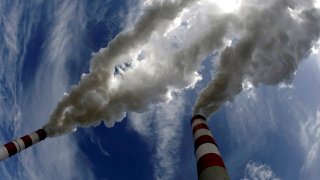
- Countries and corporations around the globe are talking up their climate credentials, pledging to achieve "net-zero" carbon or become "carbon neutral" in the next few decades.
- Unfortunately, there are no standard guidelines for achieving net zero or carbon neutral emissions. That means companies and countries can create their own definitions.
- Research from the Taskforce on Scaling Voluntary Carbon Markets shows less than 5% of carbon offsets actually remove carbon dioxide from the atmosphere.
Countries and corporations around the globe are talking up their climate credentials, pledging to achieve "net-zero" carbon emissions or become "carbon neutral" in the next few decades. But when we delve into the details, those pledges seldom live up to their promises.
"I think there's an increasing momentum behind genuine commitments to getting to net zero. I think along with that, there's always going to be some element of brainwashing," explains Christopher Greig, senior research scientist at the Andlinger Center for Energy and the Environment at Princeton University. "There are people who are basically being forced into making these commitments by shareholder pressure."
Get Boston local news, weather forecasts, lifestyle and entertainment stories to your inbox. Sign up for NBC Boston’s newsletters.
The U.S. aims to move to net zero emissions by 2050. China aims for the same in 2060. One fifth of the world's 2000 largest public firms have committed to net zero targets, according to a new report by the U.K non-profit Energy and Climate Intelligence Unit (ECIU). Visa, AstraZeneca, and Alaska Airlines all plan to eliminate carbon emissions by at least 2040, while other corporations like Apple have committed to 100% carbon neutral supply chains and products by 2030.
Unfortunately, there are no standard guidelines for achieving net zero or carbon neutral emissions. That means companies and countries can create their own definitions.
Companies who pledge to be carbon neutral are not necessarily promising to remove CO2 from their activities. Instead, they can support environmental projects that would offset their own emissions. Examples are carbon offsets from groups that install renewable energy, plant and protect trees, or provide other means to clean up the atmosphere.
Money Report
Those plans aren't necessarily realistic, or helpful. For instance, there is only so much space around the earth to plant trees. A recent Oxfam report calculated the total land required for planned carbon removal could be five times the size of India, or the equivalent of all farmland on the planet.
Research from the Taskforce on Scaling Voluntary Carbon Markets shows less than 5% of offsets actually remove carbon dioxide from the atmosphere.
"Without a scientific basis, and a true pathway to net zero...some of the effects of these trades, or these commitments, might be simply unrealizable," explains Rachel Kyte, a climate adviser for the U.N. secretary-general and the dean of the Fletcher School at Tufts University.
So what should corporations do to avoid hollow green pledges? "A corporation needs to be able to measure and verify its emissions, both within its own operations, but also upstream and downstream of its operations," Greig explains. "And it needs to be able to measure, verify, and show the outside world just how it's going against those targets."
The answer is not simple and will require resources and complicated accounting. But many argue these steps are necessary to decrease the risk that catastrophic climate change will become unavoidable.
Correction: An earlier version of this story misstated the name of the organization that did research showing less than 5% of offsets reduce CO2. The organization is called the Taskforce on Scaling Voluntary Carbon Markets.






